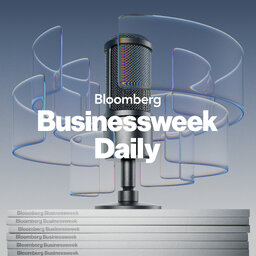Where are Semiconductors Headed Under Trump?
Watch Carol and Tim LIVE every day on YouTube: http://bit.ly/3vTiACF.
Chris Miller, Professor at Tufts University and Author of Chip War: The Fight for the World's Most Critical Technology, shares his thoughts on the semiconductor industry under the Trump administration.
Hosts: Carol Massar and Tim Stenovec. Producer: Paul Brennan.
In 1 playlist(s)
Bloomberg Businessweek
Carol Massar and Tim Stenovec bring you reporting from the magazine that helps global leaders stay a…Social links
Follow podcast
Recent clips

Nobel Prize-Winning Economist Offers a Unified Theory of Trump
11:40

Bloomberg Businessweek Weekend - January 16th, 2026
1:15:43

Trump Wants Tech Giants to Pay for Power. They’d Love To.
30:14
 Bloomberg Businessweek
Bloomberg Businessweek